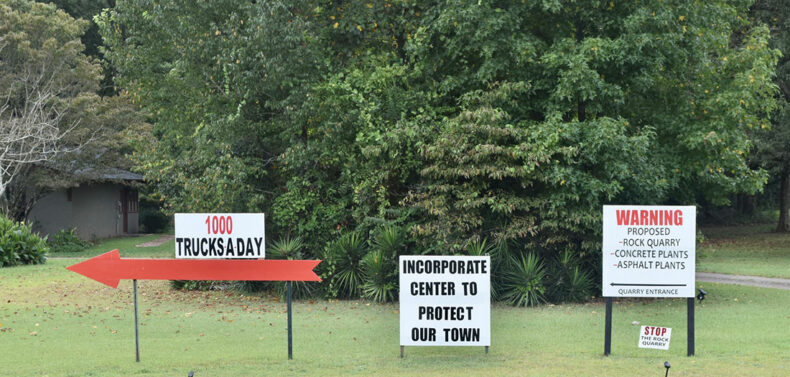A proposed rock quarry in southern Jackson County threatens Sandy Creek Park, the Sandy Creek Nature Center and the North Oconee River that supplies most of Athens’ drinking water, according to citizen groups and neighbors in Clarke and Jackson counties. The huge quarry could also damage nearby residential and agricultural wells and cause unforeseen damage through blasting, they say.
Vulcan Materials Co. hopes to excavate a new quarry in a site of about 1,000 acres just north of the Clarke County border, between U.S. Highway 441 and Chandler Bridge Road, in what former Jackson County Planning Commission Chairman Tim Cornelison called “potentially the worst possible place in Jackson County” for a quarry. The site—now forest, farm and wetland—is the largest groundwater recharge area in Jackson County, Cornelison noted in a letter to Jackson County commissioners.
The giant Alabama mining company, with revenues of more than $7.3 billion in 2022, has been seeking mining sites in this part of the state for rock to feed booming construction in and around Athens, in northern Jackson County and in other fast-growing areas nearby. Vulcan operates in four countries and in states from Georgia to California. Vulcan last year sued the Franklin County government, where zoning requirements had stymied the company’s plans to mine granite there.
Vulcan has yet to file paperwork with Jackson County requesting a zoning change, nor disclosed information about the planned scale of operations or water use. However, representatives of the company have “informally met” with Jackson County commissioners and with Jackson planning commission members, the Jackson Herald newspaper reported in May. Vulcan does intend to go forward with its plans, said Jimmy Fleming, Vulcan’s vice president for permitting and external relations. There’s no timeline for that as yet, however, he said.
Also in May, Vulcan had a grand opening for a separate quarry in another already-industrialized part of Jackson County, not so long ago largely rural and agricultural but now increasingly being swallowed up into the Atlanta megalopolis.
In the months since, hundreds of “Stop the Quarry” signs have appeared in Jackson and Clarke counties near the proposed quarry site.
“The problem is, that area is over the largest groundwater recharge area in Jackson County,” said Randy Durham, a nearby resident and a member of the nonpartisan Citizens for Sustainable Jackson County, which opposes the quarry. But water is just one of the problems, he said.
“The potential impact to our quality of life is huge with concerns for air and water pollution, noise from blasting and trucking, as well as road and traffic issues, and no studies of these impacts have been presented as yet,” according to the group’s website, citizensforsouthjackson.org.
The Jackson County group is not alone in opposing the quarry. The board of the Sandy Creek Nature Center, Inc. recently wrote to the Jackson County Commission to express “grave concerns” about the quarry plan.
“Increased siltation and industrial contaminants from stormwater runoff and the heavy withdrawal of river water for operations would detrimentally impact water quality, potentially damaging the Nature Center’s wildlife, visitor experience and educational programming,” according to Sandy Creek board president Emily Carr’s letter to Jackson County commissioners. “Additionally, the North Oconee River is a major source of drinking water for more than 100,000 people in and around Athens-Clarke County. Withdrawing surface waters and groundwater within a groundwater recharge zone will alter aquifer levels, most likely leading to contamination and/or drying of wells throughout the area.”
The advisory Oconee Rivers Greenways Commission had already formally asked Clarke County Mayor Kelly Girtz and the ACC Commission to contact the Jackson County Commission with concerns about the quarry, including effects on the quality and quantity of Athens’ water supplies, pollution entering the North Oconee River and habitat loss, including a nearby blue heron rookery. The proposed quarry site borders the North Oconee for nearly a mile.
In addition to its “highly probable” effect of depleting groundwater upstream of the North Oconee and above Sandy Creek Park’s wetlands and Lake Chapman, the quarry also has the potential of polluting water with chemicals used in the mining operation, said the Greenway Commission’s Karen Porter. That would increase the costs of treating drinking water—costs which would be passed on to Athens-Clarke water customers, she said. The quarry won’t be using chemicals in its operations, according to Fleming.
The Oconee River Land Trust has two large conservation easements protecting vulnerable wetlands on the North Oconee near the site and is also asking Jackson officials to nix the quarry plan. In addition to noise, water quality and quantity issues, as well as the rural and scenic character of the area, the quarry could further fragment the North Oconee’s function as a critical wildlife travel corridor, said Oconee River Land Trust Conservation Director Laura Hall in a letter sent to the Jackson County Planning Commission.
The Sandy Creek Nature Center board also cites Vulcan’s environmental track record—$4.2 million in fines and penalties since 2000, according to the group Good Jobs First—and the precedent the quarry would set. “We are deeply concerned that this rezoning would set a precedent that expands the industrialization of south Jackson County and the Oconee River/Sandy Creek watersheds,” according to the Sept. 6 letter Sandy Creek board president Emily Carr sent to Jackson County commissioners. “As a result of the above concerns, we respectfully ask that you abide by Jackson County’s existing land use and zoning plans and deny this rezoning request.”
Vulcan is aware of the concerns about the quarry, and will address them, Fleming said. The quarrying operation is projected to use only about 200 acres of the site, which is two to three times the acreage of most Vulcan operations, he said. That will leave ample areas for larger buffer areas and designation of certain areas for conservation use, he said. The quarry won’t go deep enough to impact the underlying aquifer, he said.
“We feel very good about what we’ve been able to incorporate,” Fleming said.
Like what you just read? Support Flagpole by making a donation today. Every dollar you give helps fund our ongoing mission to provide Athens with quality, independent journalism.










